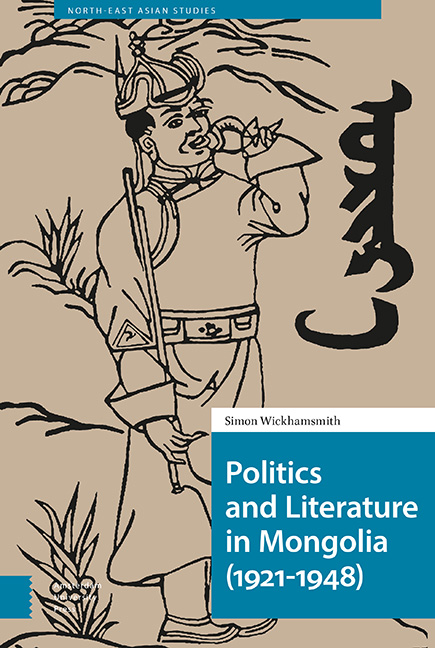Book contents
- Frontmatter
- Dedication
- Contents
- Transliteration and Mongolian Names
- Introduction
- 1 Prefiguring 1921
- 2 Staging a Revolution
- 3 Landscape Re-Envisioned
- 4 Leftward Together
- 5 Society in Flux
- 6 Negotiating Faith
- 7 Life and its Value
- 8 The Great Opportunistic Repression
- 9 A Closer Union
- Appendix: Brief Biographies of Writers
- Index
Appendix: Brief Biographies of Writers
Published online by Cambridge University Press: 21 November 2020
- Frontmatter
- Dedication
- Contents
- Transliteration and Mongolian Names
- Introduction
- 1 Prefiguring 1921
- 2 Staging a Revolution
- 3 Landscape Re-Envisioned
- 4 Leftward Together
- 5 Society in Flux
- 6 Negotiating Faith
- 7 Life and its Value
- 8 The Great Opportunistic Repression
- 9 A Closer Union
- Appendix: Brief Biographies of Writers
- Index
Summary
This appendix contains biographical material on the writers whose work is covered in this book as well as on others who are not mentioned. It is in no way an exhaustive list, but it is hoped that it will provide an overview of the voices that can be heard in Mongolian literature in the first quartercentury following the revolution. Most of the material presented here offers background to individuals’ literary lives rather than adding to the material covered in the chapters of the book.
It is often hard to find specific works, whether anthologized, or in volumes devoted to individual authors. For those who know Mongolian or Russian, internet searches, for example using worldcat.com, may produce texts that can be borrowed or purchased as well as further information. Second-hand bookstores in Ulaanbaatar remain the most likely source of books by these writers. Finally, the three volumes of M. Bayanzul's Mongolyn Uran Zohiolyn Nom Züin Toim 1921-1961 (Ulaanbaatar: BNMAU Shinjleh Uhaan Akademi, 1966) offer an almost, but not totally, complete listing of writers active during this period – many of whom are included in this book – and their works.
Ahtaan, Babyn (1896-1973)
Born in Bayan-Ölgii province, he grew up speaking Kazakh. His mother was a well-known singer and poet, and he developed an early interest in Kazakh oral literature, starting to write around the age of 12. He developed into a writer of lyrical poetry and plays, his best-known piece being the long lyric poem Bürged (The Eagle). He worked as a local cultural manager in Bayan-Ölgii, while his work was promoted in Mongolia through the translations of D. Sengee and B. Baast.
Ayuush, Shirnengiin (1903-1938)
Born in Töv province. Ayuush was an actor and playwright. In 1922, he had his first role in S. Buyannemeh's play Sando Amban, and in 1924 was one of the founder members of the Sühbaatar Club, which brought together performing artists such as musicians, singers, dancers and actors to entertain audiences in post-revolutionary Mongolia. Ayuush studied in the Soviet Union during the mid-1920s and while there came into contact with the ideas of agitprop theater and the ‘living newspapers’ presented by the Blue Blouse theater group. Accused of being a Japanese spy, he was executed in 1938.
- Type
- Chapter
- Information
- Politics and Literature in Mongolia (1921–1948) , pp. 321 - 344Publisher: Amsterdam University PressPrint publication year: 2020



